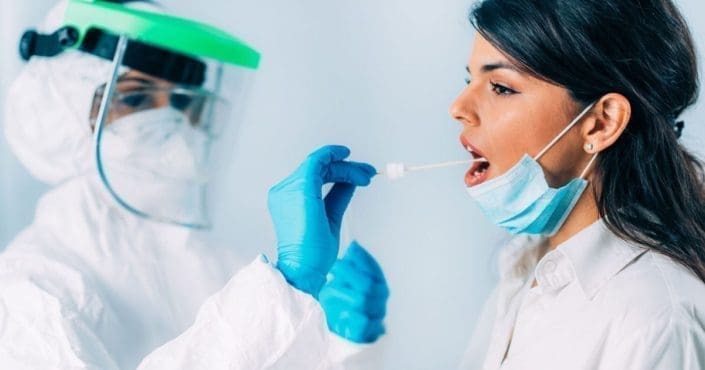
Who should get tested for COVID-19?
If you think you have COVID-19, stay home and contact your family doctor to get advice on what you should do next. Information on COVID-19 testing options and availability continues to change.
The Centers for Disease Control and Prevention (CDC) has released guidance on who should be tested, including:
- People who have symptoms of COVID-19.
- People who have had a known exposure to someone with suspected or confirmed COVID-19.
- People who are fully vaccinated should get tested 3-5 days after exposure, and wear a mask in public indoor settings for 14 days or until they receive a negative test result.
- People who are not fully vaccinated should quarantine and be tested immediately after being identified. If negative, they should be tested again in 5–7 days after last exposure or immediately if symptoms develop during quarantine.
- People not fully vaccinated with COVID-19 vaccine who are prioritized for expanded community screening for COVID-19.
- People not fully vaccinated with COVID-19 vaccine who have been asked or referred to get testing by their school, workplace, physician, state, tribal, local or territorial health department
Not everyone needs to be tested, which is why you should check with your family doctor. If you do get tested, you should self-quarantine at home pending test results and follow the advice of your doctor.
How do I get tested for COVID-19?
Testing availability may differ depending on where you live. Check your local health department to see what locations near you are doing testing. This may include hospitals, clinics, doctors’ offices, pharmacies, and free-standing locations. Some of these will require you to physically go inside. Others offer drive-thru tests and allow you to stay in your car to prevent the possible spread of COVID-19. Depending on the location, someone may approach your car to collect a sample, or they may ask you to collect it yourself. Samples for COVID-19 viral tests are collected through nasal swabs or through saliva samples.
Depending on where you get your test, you may get your results the same day or you may have to wait a few days. Your results can be delayed if a large number of tests in your area are being performed. It’s also important to remember that even if you get a negative test, you may still need to self-isolate if you have been exposed to COVID-19. This is because it can take time after exposure for your sample to show a COVID-19 infection.
What tests are available for COVID-19?
Two types of tests for COVID-19 are currently available:
- Diagnostic tests
- Antibody tests
The U.S. Food and Drug Administration (FDA) made these tests available under an emergency use authorization. This means that they can be used during a public health emergency. They have not been fully reviewed and approved by the FDA.
At this time, we have limited information on how accurate COVID-19 tests are. It is possible for them to show positive results that are wrong (called a false positive). They can also show negative results that are wrong (called a false negative). Even if your test result is negative, it’s important to keep following your family doctor’s recommendations to prevent the spread of COVID-19.
What are the diagnostic tests for COVID-19?
Two kinds of tests are available to diagnose a current COVID-19 infection: a molecular test and an antigen test.
The molecular test is also called a polymerase chain reaction (PCR) test. It detects genetic material of the virus that causes COVID-19 (called SARS-CoV-2). It is the most accurate diagnostic test for COVID-19.
The antigen test requires a sample collected by swabbing the inside of your nose. This test works by detecting a unique protein on or around the virus that causes COVID-19. If enough of this protein is detected, the test is positive. This means that you have an active COVID-19 infection.
Antigen tests are faster than molecular tests, but they are not as accurate. If you have a negative antigen test, your doctor may recommend a molecular test to confirm it.
What is an antibody test?
The antibody test (also called a serology test) checks your blood for antibodies to the virus that causes COVID-19. Your immune system makes antibodies to help fight harmful viruses and bacteria. They are produced a few days or weeks after you are infected. Different antibodies are produced to fight different infections.
If antibodies are detected in your blood, it could mean that you currently have COVID-19 or that you have had COVID-19 recently. But a positive antibody test could mean that you were infected with a different coronavirus in the past. This is why antibody tests are not used to diagnose a current COVID-19 infection.
A negative antibody test means that it is likely you have not had COVID-19 in the past. It could also mean that you are currently infected with COVID-19 but haven’t started producing antibodies yet.
Researchers do not know yet whether people who have been infected with COVID-19 have any immunity to the virus or for how long. Regardless of your test results, you should continue to take steps to protect yourself and others from the coronavirus.
Resources
Centers for Disease Control and Prevention: COVID-19 Testing Overview
Centers for Disease Control and Prevention: Fact Sheet for Patients
![]()
Copyright © American Academy of Family Physicians
This information provides a general overview and may not apply to everyone. Talk to your family doctor to find out if this information applies to you and to get more information on this subject.






